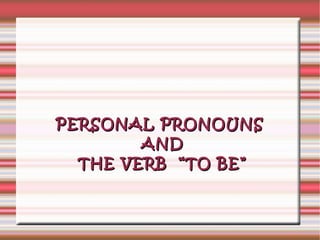Pronouns and the verb to be
•Descargar como ODP, PDF•
4 recomendaciones•6,364 vistas
Denunciar
Compartir
Denunciar
Compartir

Recomendados
Más contenido relacionado
La actualidad más candente
La actualidad más candente (16)
2013 2014 eğitim ve öğretim yılı ingilizce dersi 6. sınıf 1.dönem 1.yazılı sı...

2013 2014 eğitim ve öğretim yılı ingilizce dersi 6. sınıf 1.dönem 1.yazılı sı...
Similar a Pronouns and the verb to be
Similar a Pronouns and the verb to be (20)
Más de cefeli
Más de cefeli (20)
Último
This presentation was provided by William Mattingly of the Smithsonian Institution, during the fourth segment of the NISO training series "AI & Prompt Design." Session Four: Structured Data and Assistants, was held on April 25, 2024.Mattingly "AI & Prompt Design: Structured Data, Assistants, & RAG"

Mattingly "AI & Prompt Design: Structured Data, Assistants, & RAG"National Information Standards Organization (NISO)
APM Welcome
Tuesday 30 April 2024
APM North West Network Conference, Synergies Across Sectors
Presented by:
Professor Adam Boddison OBE, Chief Executive Officer, APM
Conference overview:
https://www.apm.org.uk/community/apm-north-west-branch-conference/
Content description:
APM welcome from CEO
The main conference objective was to promote the Project Management profession with interaction between project practitioners, APM Corporate members, current project management students, academia and all who have an interest in projects.APM Welcome, APM North West Network Conference, Synergies Across Sectors

APM Welcome, APM North West Network Conference, Synergies Across SectorsAssociation for Project Management
Último (20)
Disha NEET Physics Guide for classes 11 and 12.pdf

Disha NEET Physics Guide for classes 11 and 12.pdf
Mattingly "AI & Prompt Design: Structured Data, Assistants, & RAG"

Mattingly "AI & Prompt Design: Structured Data, Assistants, & RAG"
Kisan Call Centre - To harness potential of ICT in Agriculture by answer farm...

Kisan Call Centre - To harness potential of ICT in Agriculture by answer farm...
APM Welcome, APM North West Network Conference, Synergies Across Sectors

APM Welcome, APM North West Network Conference, Synergies Across Sectors
A Critique of the Proposed National Education Policy Reform

A Critique of the Proposed National Education Policy Reform
social pharmacy d-pharm 1st year by Pragati K. Mahajan

social pharmacy d-pharm 1st year by Pragati K. Mahajan
Beyond the EU: DORA and NIS 2 Directive's Global Impact

Beyond the EU: DORA and NIS 2 Directive's Global Impact
IGNOU MSCCFT and PGDCFT Exam Question Pattern: MCFT003 Counselling and Family...

IGNOU MSCCFT and PGDCFT Exam Question Pattern: MCFT003 Counselling and Family...
9548086042 for call girls in Indira Nagar with room service

9548086042 for call girls in Indira Nagar with room service
Pronouns and the verb to be
- 1. PERSONAL PRONOUNS AND THE VERB “TO BE”
- 2. SINGULAR PLURAL Pronouns * A pronoun takes the place of a noun * I we you you he they she it
- 3. are they are She is it is we SINGULAR PLURAL I am He is you are Be: am, are, is
- 4. I am a student Contraction/short form I´m a student Negative form I am not a student I´m not a student Be: am, are, is
- 5. FULL FORM SHORT FORM You are very smart you´re very smart We are cousins we´re cousins You are good tennis players you´re good tennis players They are good students they´re good students Be: am, are, is
- 6. FULL FORM SHORT FORM He is very smart He´s very smart She is my cousin She´s my cousin He is my teacher He´s my teacher Be: am, are, is
- 7. NEGATIVE FORM SHORT NEGATIVE FORM You are not very smart you aren´t very smart We are not cousins we aren´t cousins You are not good tennis players you aren´t good tennis players They are not good students they aren´t good students Be: am, are, is
- 8. She is a nurse * Is she a nurse? AFFIRMATIVE SENTENCES QUESTIONS He is an excellent teacher Is he an excellent teacher? She is in the bedroom Is she in the bedroom? They are in the garden Are they in the garden? * When changing is-are sentences to questions, use the cross rule where the verb in the questions goes to the beginning of the sentence.
- 9. SHORT ANSWERS Yes, he is /No, he isn't Yes, she is / No, she isn't Yes, they are / No, they aren't Yes, it is / No, it isn't QUESTIONS Is he an excellent teacher? Is she in the bedroom? Are they in the garden? Is it a blue car? * In short answers we never use subject-verb contractions, but we can use the verb+not contraction.